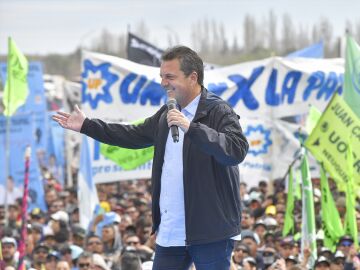
Peronism, the Argentine force that permeates the country’s political life and that is difficult to understand outside its borders, showed its muscle in the general elections held this Sunday, in which its candidate, Sergio Massanot only went to the second round against the libertarian Javier Milei, but also was the most voted.
He current Minister of Economyresponsible for his position in the Government of the Peronist Alberto Fernández de la serious socioeconomic situation that the country is going throughwith interannual inflation that climbed to 138.3% in September, a poverty level of 40.1% and an exchange gap greater than 200%, was not at all affected by these data.
Compared to the 21.43% he obtained in the PASO elections (simultaneous and mandatory open primaries), with 97.40% of the tables counted this Sunday, Massa grew to 36.61%, more than 6.6 points above de Milei, who “kicked” the Argentine political board when last August he became the leader with the most votes of those who aspired to the Presidency.
Although all the polls anticipated a runoff scenario for November 19, the August precedent, when no consultancy announced the victory of the candidate of La Libertad Avanza (ultra-right), generated great uncertainty in the face of an Argentina politically divided into three thirds who left the primaries.
Far from being affected by losing that first place achieved in August, Milei – who obtained 30.03% support – defined this Sunday as “a historic day” for having achievedin only two years of existence of La Libertad Avanza, “dispute for power the most disastrous thing that modern history has given”, Kirchnerism, which he said “is the worst thing that has happened to Argentina.”
Massa demands “a unity government”
Tonight’s great winner, Sergio Massa, reiterated an idea repeated throughout the campaign, that of calling “a unity government”, and stated that, with it, “the rift is over” as of December 10 , when the next president of Argentina should take office.
Without the presence of either the president, Alberto Fernández, or the vice president, Cristina Fernández, at the celebrations, the Economy Minister’s speech sounded like turning the page on Kirchnerism – the wing of Peronism linked to the late former president Néstor Kirchner (2003-2007). and the former president (2007-2015), whom he himself opposed and which led him to create the Frente Renovador -, so reviled and criticized by his electoral opponents.
Definitely, The big loser in these elections was the candidate of Together for Change (center-right), Patricia Bullrich, who was not able to retain the 28% of votes that his party achieved in the primaries – when the former Minister of Security competed with the mayor of Buenos Aires, Horacio Rodríguez Larreta -, despite having eight provincial governors and winning the elections in 2021. last legislative elections. After insisting on defending his “values”, despite not having achieved the objective achieved, the former member of Mauricio Macri’s cabinet (2015-2019), who closed this Sunday with 23.84%, said that “populism has impoverished the country.” Bullrich announcement: “I am not the one who is going to come to facilitate the return to power of someone who has been part of the worst Government in the recent history of Argentina”, thus refusing to support Massabut at the same time avoiding making explicit his support for Milei.
Peronism had its second victory of the night by retaining the Government of the province of Buenos Aires, the most populated in Argentina and the historic electoral bastion of that political formation. With 96.43% of the voting tables counted, the governor of the province and candidate for re-election, Axel Kicillof, obtained 44.87% of the votes in an election where – unlike the presidential elections – the victory It is achieved by simple majority. Kicillof relegated Néstor Grindetti to second place (26.62%), from Together for Change (center-right).
Meanwhile, the Government of the City of Buenos Aires remained undefined and pending final scrutiny that will begin on Tuesday. The Together for Change candidate, Jorge Macri, was a few tenths away from the achievement, as he obtained 49.62%, while the Peronist Leandro Santoro added 32.20%. If it is confirmed that the center-right does not reach 50%, there will be a second round.
In Argentina, the provisional scrutiny carried out by the Executive on voting day is only intended to inform the population, but the only one that has legal validity is the final one, carried out by the electoral authority, which will begin next Tuesday. Some 35.4 million Argentines were summoned at one o’clock this Sunday to elect president and vice president, and also renew 130 of the 257 seats in the Chamber of Deputies and 24 of the 72 in the Senate, and appoint 43 Argentine representatives to the Parliament of the Mercosur (Parlasur, legislative body of the bloc made up of Argentina, Brazil, Paraguay and Uruguay).
Source: Lasexta
Ricardo is a renowned author and journalist, known for his exceptional writing on top-news stories. He currently works as a writer at the 247 News Agency, where he is known for his ability to deliver breaking news and insightful analysis on the most pressing issues of the day.












